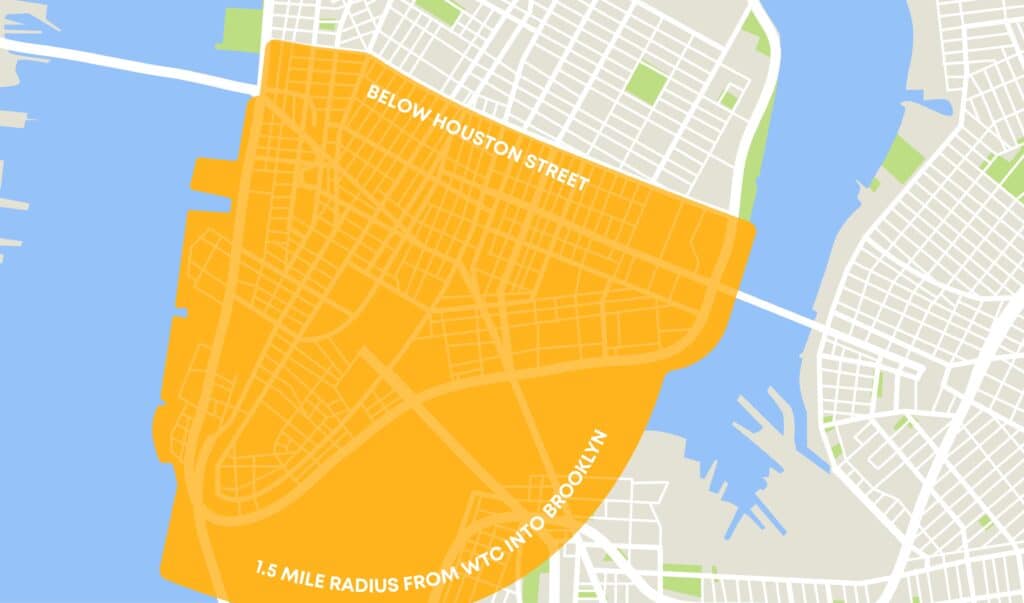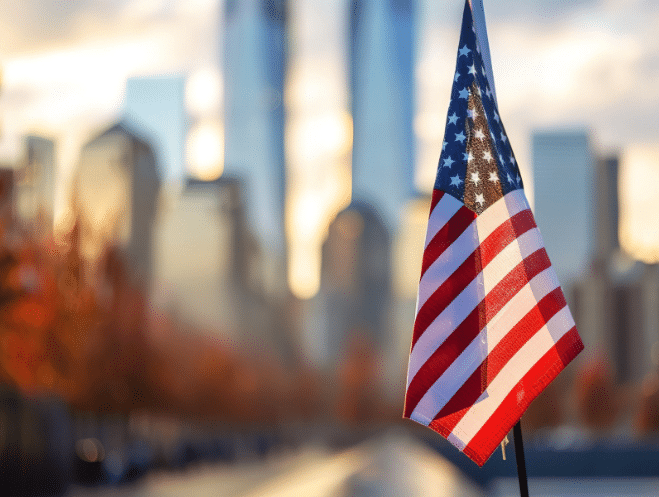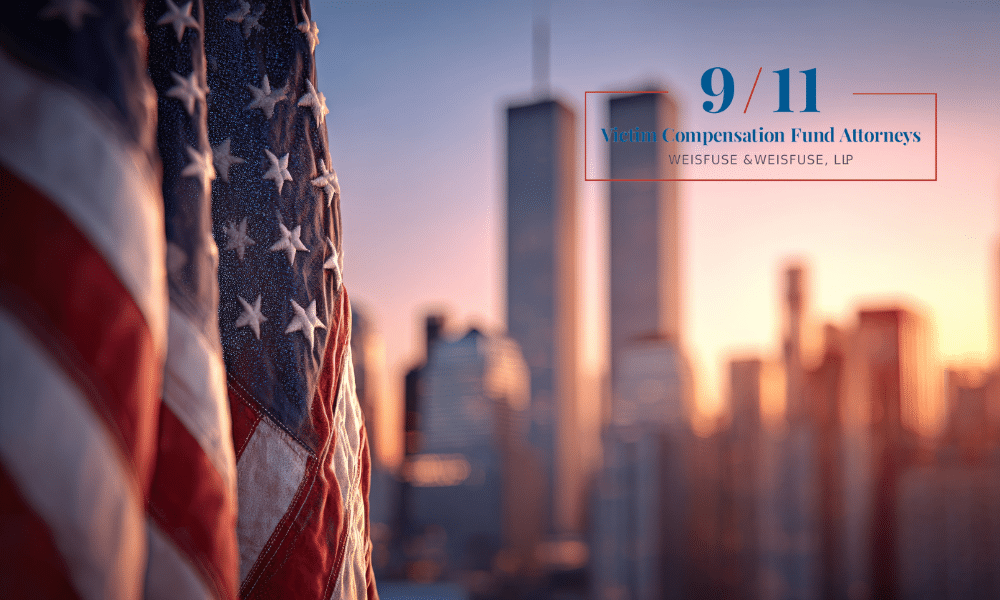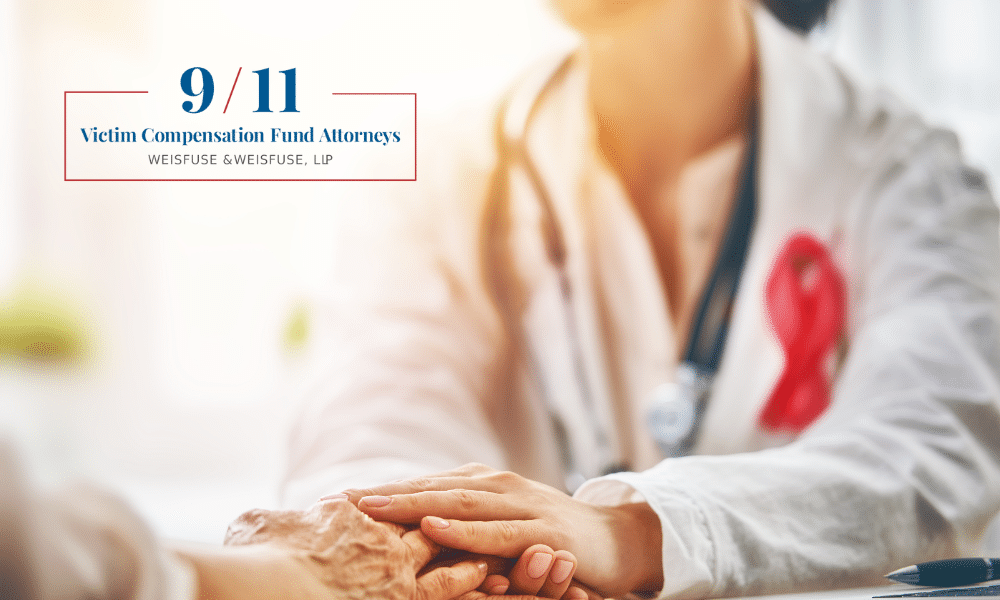On September 11th, 2001, the collapse of the World Trade Center towers resulted in a toxic dust plume that permeated the air in the NY and NJ metropolitan areas and extended to Lower Manhattan. The dust cloud contained more than 100,000 µm per cubic meter of carcinogenic particles, including asbestos, lead, pesticides, chromium, benzene, and polychlorinated biphenyls (PCBs).
The 9/11 disaster impacted about 25,000 residents of Lower Manhattan, and the air quality remained poor for months after the attacks. Consequently, residents of this area reported an increased prevalence of multiple respiratory conditions, including asthma, chronic cough, and wheezing. As time passed, more and more Lower Manhattan residents came forward with 9/11-related cancers & illnesses. Even now, nearly 20 years after the attacks, individuals exposed to the toxic dust near Ground Zero are still being diagnosed with related illnesses.
VCF Compensation and WTCHP Medical Care Available to Downtown Manhattan Residents
The James Zadroga 9/11 Health and Compensation Act of 2010, named for the first NYPD officer to die of an illness related to 9/11 toxic dust exposure, resulted in creating two valuable programs. The World Trade Center Health Program (WTCHP) provides medical care and health monitoring to victims of 9/11 illnesses, while the September 11th Victim Compensation Fund (VCF) provides financial compensation to eligible victims.
The WTCHP certifies illnesses and injuries that are eligible for benefits through both programs. Residents of Lower Manhattan diagnosed with a certified illness may apply for WTCHP and VCF benefits. Even individuals who resided in Lower Manhattan during qualifying dates, who are not currently exhibiting symptoms of a certified illness or injury, should register with the VCF by July 29th, 2001. Doing so guarantees that any future claims are promptly reviewed. A VCF attorney can help victims determine eligibility and file a timely claim for medical benefits and financial compensation.
Lower Manhattan Residents With 9/11 Related Illnesses Can Receive Compensation & Care
Although the list of WTCHP-certified medical conditions is extensive, certain conditions are more prevalent than others. Respiratory illnesses and cancers are among the most common. Certified conditions include:
- Aerodigestive conditions, including asthma and sleep apnea;
- 68 different forms of cancer, including leukemia, breast cancer, brain cancer, and childhood cancers;
- Mental health disorders, such as depression, post-traumatic stress disorder (PTSD), and substance abuse; and
- Acute traumatic injuries, including eye injuries, burns, fractures, and brain injuries.
The list above is not exhaustive. Here is the complete list of WTCHP-certified health conditions and injuries. Furthermore, even illnesses and injuries that are not specifically certified by the WTCHP may be eligible if they are associated with one of the certified conditions. A 9/11 fund lawyer can help individuals who resided in Lower Manhattan on qualifying dates protect their rights and determine how to proceed.
Lower Manhattan Residents Living In The 9/11 Exposure Zone
Lower Manhattan is included in the area now referred to as the 9/11 Exposure Zone, which covers a 1.5-mile radius around Ground Zero. As such, anyone who lived in Lower Manhattan between September 11th, 2001 and May 30th, 2002, who is suffering from a WTCHP-certified medical condition, may be eligible to obtain significant compensation and quality medical care.
To obtain these benefits, individuals must provide Proof of Presence in the Exposure Zone during the eligible eight-month timeframe. According to the Victim Compensation Fund Claim Form Document Checklist, victims must submit a minimum of two Proof of Presence forms.
Residents of Lower Manhattan may use the following residential records:
- Rental lease
- Rent or mortgage receipts
- Utility bills
- Sworn affidavits by witnesses who can attest that the individual was a resident of Lower Manhattan during the qualifying time period
With nearly 20 years having passed since 9/11, it is becoming increasingly difficult for survivors to obtain Proof of Presence documentation. Fortunately, an experienced 9/11 attorney can help these individuals locate and obtain the required documentation and file a timely, accurate claim for benefits and compensation.
How To Apply For VCF or WTCHP Benefits
Residents of Lower Manhattan who wish to apply to the WTCHP for medical care and the VCF for compensation are strongly encouraged to seek legal counsel. The application process is complex, and even minor errors can result in delayed, reduced, or denied benefits.
A 9/11 lawyer can help lower Manhattan residents determine eligibility, gather Proof of Presence documents and other necessary documentation, and submit a timely application for benefits.
Residential victims will first need to be diagnosed with a WTCHP-certified condition and show proof of residence in Lower Manhattan during the qualifying dates. Once these prerequisites are fulfilled, a VCF attorney can help the applicant file an accurate claim, including all necessary documentation.
Contact Weisfuse & Weisfuse, LLP Today
There are strict dates for filing a timely claim, so it’s in the best interest of anyone present in the Exposure Zone between September 11th, 2001 and May 30th, 2002 to seek immediate legal counsel from an experienced VCF lawyer. At Weisfuse & Weisfuse, LLP our VCF law firm has helped countless survivors obtain the medical care and compensation they need, submitting medically-supported optional impact statements to maximize the potential award, and providing thorough and compassionate service tailored to each client’s unique needs. Call us today at 212-983-3000 for a free and confidential consultation.







